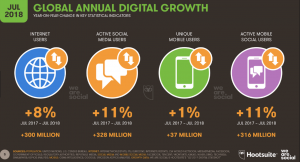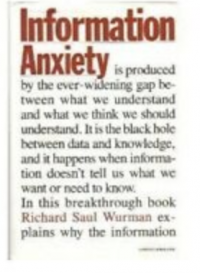Difference between revisions of "Information Overload"
| Line 55: | Line 55: | ||
<references/> | <references/> | ||
}} | }} | ||
| + | [[Category:2019New]] | ||
Revision as of 12:59, 19 April 2019
Contents
Definition
In the context of ethics and information technology, information overload can be considered to be a general difficulty of gathering information on a topic due to there being an overwhelming abundance of information that is accessible. In a broad sense, this is the large amount of information that the average internet user is exposed to on a daily basis. The notion of this overwhelming nature of large amounts of information is notably defined by Luciano Floridi as primarily being a topic that is shaped by theories of processes knowledge and information perception, "...at a certain point the system does not absorb anything." This can be applied to individuals as one's capacity to absorb and process information is a limited system.
Modern information technology systems have been a large driver in accommodating the large amounts of data that are accessible both for personal use and businesses.
History
Information preservation has been prevalent since its emphasis by Renaissance humanists. This primarily followed Gutenberg's invention of the printing press and the ability of the general public to have access to an amount of information that they had never had access to within a short period of time. Within the 1700’s a growing concern developed pertaining to the increasing availability of books. Specifically, within Germany, France, and England there was a significant surge of the production of books from 1750 to 1800, there was a 150% increase in the production of books. Christian Thomasius argued that the standards of the books being published was decreasing given the large volume that was being produced. [1].
Since then, there has been information explosion. The first time this term was used was a New York Times article in 1964 when author Walter Sullivan described there being much to be discussed involving this phrase and its dominance in an emerging information culture.
Modern Information Age
In regards to the modern age, information overload has gained it prevalence due to the speed at which information is produced and published (primarily via the internet). On a daily basis active internet users are exposed to emails, news publications, search engines, etc. whose overwhelming side effect for many are caused my instant notification and alerts on their mobile devices and computers.
This information overload is also referred to as an “information glut”, “infobesity”, and “information anxiety”.
Driving Forces
Social Media
Within the realm of shared content and the amount of information that individuals have access to has been undoubtedly shaped by the prominence of social media. The phenomena of information overload in regards to social media can be more easily observed on a higher level verses from the level of an individual user.
Internet reliability controversy
The internet has provides the average person with access to billions of publications at a increasing rate day by day. Although search engines serve as a platform for the average person to have access to a vast amount of information, the level at which is information is filtered by accuracy is questionable. This idea of “fake news” is one that has been increasing in popularity and adds to the overwhelming feeling when navigating through large amounts of information via a simple search engine.
Reaction
Adjusting to information overload
On a per individual basis, the recent decade has seen an upsurge in the demand for techniques and methods to adjust to and cope with the rising amount of information that the average internet user has access to. Given the nature of this topic, there are two primary ways that an individual can choose to deal with it. The first being the individual can attempt to reduce the amount of information that is incoming or he/she can attempt to expand upon their ability to process information.
For example, minimizing the number of notifications that an individual receives is argued to reduce the overwhelming amount of “noise” that an individual is put into contact with on a daily basis. [2].
Richard Saul Wurman describes the issue as being one of the organization of information, rather than an issue of there being too much available. This “information anxiety” is therefore the result of a disorganization of complex data as well as the average person not being “information literate” in their ability to process and interpret an abundance of information that comes their way. Information Management has gained its relevance as an organizational priority as it adds efficiency to the process of creating relevance to and the transformation of data to information.
Ethical Implications
The main ethical concern regarding information overload is the concept that the average person's ability to make decision is tampered with due to the overwhelming amount of information that is available to them. There has also been an increase in the level of entropy that an individual experiences with the increasing amount of information that they have access to. This is primarily caused by the misalignment of the rate at which digital information is being produced and the rate at which individuals can process information. There soon develops a "poverty of attention". [3]
Luciano Floridi discusses the many ethical implications of having access to a plethora of public information. He acknowledges a greater discussion of privacy concerns dealing with individuals in public groups. He questions, ""does respect for individual's privacy require respect for privacy of the group to which the individual belongs to?"[4].
Future Trends
Recent research suggests that an "attention economy" of sorts will naturally emerge from information overload. Matthew Crawford defines this as "Attention is a resource—a person has only so much of it." [5].This impacts business in both the products consumers look for and how business communicate internally with a growing desire for instantaneous reach and information. Whether it is the management of internal emails or the management of large amounts of data, this overwhelming feeling that comes with large amounts of information has seeped into a corporate setting.
See Also
References
- ↑ Blair, Ann "Information Overload’s 2,300-Year-Old History" 'HBR, (Retrieved 26 February 2017.)
- ↑ Pot, Justing "Eating Only Dessert: Why Your Information Diet Is Probably Terrible " 'MUO, (Retrieved 26 February 2017.)
- ↑ https://www.foreignaffairs.com/articles/united-states/2014-06-16/age-entropy
- ↑ https://www.oii.ox.ac.uk/videos/big-data-small-patterns-and-huge-ethical-issues/
- ↑ Crawford, Matthew "The Cost of Paying Attention" 'NY Times, (Retrieved 26 February 2017.)

